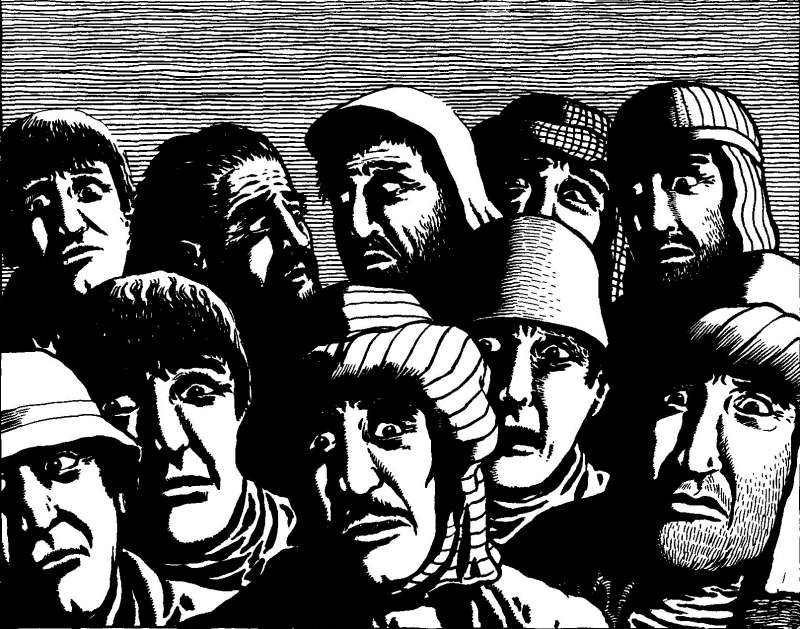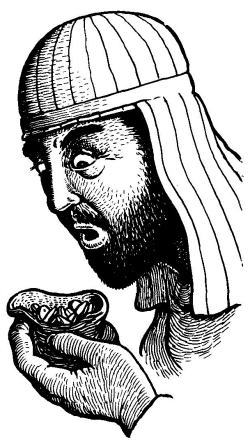Seven good years passed. The next year there was a change in the weather. Showers almost ceased. Streams dwindled. Hot winds blew more often. Green fields turned yellow. Within a few months it was plain that the crops were going to fail. The second half of Joseph's prophecy was beginning to happen. The time of famine had arrived.
Before long farmers in some regions began to run out of food for their animals and grain for bread. It was then that Joseph ordered the storehouses opened. As demands for grain grew, it was plain that if the crops hadn't been stored, thousands of Egyptians would have starved in the first year or two of the famine period. (Verse 54) The famine wasn't only in Egypt. Lack of rain affected many nations. Before long other peoples were begging the Egyptians to sell them grain and meat. Joseph gave orders that provisions should be sold to all outsiders who were in dire need. (Verses 55-57)
Jacob Sends His Sons for Food
Back in Canaan, Joseph's father, Jacob, was one of many worried by conditions. There was hardly any grass for his animals. Continued dry weather would mean they would die. There would soon be neither grain nor meat to eat.
Jacob had heard that Egypt had grain to sell, so he sent ten of his sons there to buy some. Because he had lost young Joseph years before by sending him on a trip, Jacob kept Benjamin, his youngest son, with him. (Gen. 42:1-4)
Taking camels and donkeys to carry back the loads they hoped to buy, the ten sons went down into Egypt to find that they would have to bring their request for grain to the governor, who was next in power to Pharaoh. When they came before the governor, they had no idea that he was the brother they had sold for a slave many years before.
Joseph knew them as soon as they came before him. When they bowed, he remembered having dreamed as a lad that his brothers were bowing to him. At last that prophetic dream had come true. (Verse 6)
Joseph wanted to welcome them and tell them who he was. Instead, he decided to be harsh with them for their own good.
"You say you have come from Canaan to buy food. Why should I believe that?" he asked harshly. "I think you are spies! Probably you think that Egypt is weakening because of the famine, and you are here to check on our military strength!"
"We aren't spies, sir!" they quickly replied. "We are the sons of an elderly man who needs food. Our father had twelve sons. The youngest is with him. One is dead." (Verses 9-13)
Joseph wanted to ask about Benjamin, but he had to remain stern.
"It might be wise to keep nine of you in prison and send one of you to bring back the brother and father you claim you have," he continued. "Then I might be convinced you aren't spies."
The ten brothers stood uncomfortably before Joseph while he kept frowning at them.
"On second thought," added Joseph, "I believe it would be better to put you all in prison to give you a chance to think matters over and decide to tell the truth."
"But we're telling the truth!" they called to Joseph as guards led them away. (Verse 17)
Three Days Later
After three days Joseph had his brothers brought before him. They still insisted that they had come only to buy needed grain.
"You will get your grain," Joseph surprised them by saying. "However, one of you will stay here in prison until the young brother you speak of is brought to me!"
The brothers' faces fell. Each feared he would be the one to be jailed.
"This trouble has come on us because of what we did to Joseph," they murmured fearfully among themselves.
"I told you it was wrong to treat him the way you did!" Reuben spoke up. "Now we may pay for it."

Joseph's ten brothers were filled with fear when they were told that they would be jailed.
|
All this talk between Joseph, who spoke in Egyptian, and his brothers, who spoke only in Hebrew, had been through an interpreter. (Verse 23) Joseph still remembered his native tongue, and when he heard his brothers talking excitedly among themselves, he understood every word. He felt so sorry for them that he turned his head away and wept, even though they had treated him brutally in the past.
"The guards will take one of you back to prison," he said, controlling himself.
|
He looked slowly over the tense faces before him. His eyes settled on Simeon, the brother who had suggested killing him when he, Joseph, was only seventeen years old.
"Take that man to the dungeon!" Joseph snapped, pointing to Simeon.
Guards swiftly bound the protesting Simeon and dragged him away. It was becoming plainer to the brothers that God was having a hand in their affairs.
"Leave now," Joseph told the remaining nine. "You will be told where to pick up your grain and how much to pay."
The Brothers Hurriedly Leave Egypt
Later, after the brothers had bought the grain and loaded it on their animals, they were relieved to depart. At dusk they stopped where the animals could be fed and sheltered for the night. When one of the brothers opened his grain sack to feed his animal, he discovered a bag of coins that contained the exact amount he had paid for the sack of grain.
"It must be the money I paid for my part of the grain!" he exclaimed. "How did that get there?"
"This is not good," one of the brothers said. "It could be a scheme to arrest you for not paying for the grain."
"They could arrest all of us if they could prove that one of us is a thief," said another. "God is dealing with us because of the wrong things we have done." (Verses 25-28)
During the rest of the trip the brothers feared that Egyptian soldiers would overtake them, but they safely reached home in Canaan.
Jacob was happy at their return with the grain, but he was most unhappy to learn that Simeon was being held prisoner and that the governor of Egypt had demanded to see Benjamin.
|

When the brother looked in
his travel sack, he found a
bag of coins — the exact
amount he had paid
for his grain!
|